The Final Days of EMI review – from Beatles glory to Coldplay toothbrushes | Books | The Guardian


In the summer of 1965, the Rolling Stones released “(I Can’t Get No) Satisfaction”. On the US version, its B-side was a makeweight piece titled “The Under Assistant West Coast Promotion Man”, which directed sneering contempt on some poor unfortunate who worked for the group’s record label: “I promo groups when they come into town / Well they laugh at my toupee, they’re sure to put me down.”
Thus began a lineage of rock songs founded on the eternal contradiction between the artistic impulse and the hucksterish, often seedy ways of the music business. This reached a peak of fury and cynicism in the era of punk with the Sex Pistols’ gloriously incoherent classic “EMI”, in which John Lydon vents his rage at the company that put out the group’s first single in 1976, only to dump them. “It’s an unlimited supply,” he spits. “And there is no reason why / I tell you it was all a frame / They only did it ’cos of fame / Who? / EMI!”
Electric and Musical Industries was founded in 1931. Its activities included innovative work on TV and radar technology, but it became part of millions of lives via its role as a music company, split between such labels as Parlophone, Columbia and His Master’s Voice. As rock’n’roll unfolded, its culture often seemed comically stuffy (at the company’s renowned Abbey Road studios, recording engineers had to wear white lab coats). But EMI’s place at the core of global pop culture was assured when, in 1962, George Martin signed the Beatles to Parlophone, and the group subsequently posed for the cover of their debut album in among the modernist geometry of EMI’s HQ at Manchester Square, in central London, grinning from ear to ear.

Forty years later, things at EMI were not nearly as cheerful. The company had enjoyed a good 1990s, putting out big-sellers by Blur and Radiohead and eventually signing Coldplay. But it was in debt, and the commercial climate was growing chilly. Thrown by illicit music-sharing on the internet and the resulting decline in sales of CDs, record companies were amalgamating at speed. EMI was lonely and vulnerable, and in August 2007, it was bought for £4.2bn – £2.6bn of which was borrowed from the US bank Citigroup – by a private equity firm called Terra Firma. Its new owners were headed by Guy Hands, described by the Evening Standard as “a dishevelled six-footer with an unkempt bouffant and tombstone teeth”.
Eamonn Forde has been writing about the music industry for nearly 20 years. Though slightly sullied by an opening section that spurns laying out the reasons why EMI was a household name in favour of business arcana, his account of what happened next is an addictive blend of tragedy, comedy and insight. One of Hands’s first pronouncements about EMI points to the farce that was about to happen: “We look for the worst businesses we can find in the most challenged sector – and we get happy if it’s really, really bad … We’re just hoping EMI is as bad as we think it is.”
Terra Firma had a few good ideas but, on the whole, it embodied the kind of mind-boggling business culture that had gained steam through the 90s. Hands insisted EMI was initially examined by the obligatory management consultants, including KPMG and McKinsey. Its first months in charge of the company were marked by a very New Labour-ish internal PR war: “all these different comms teams briefing and … counter-briefing against each other”. There is a horrible inevitability to the arrival in the story of the former BBC director general and former Tony Blair adviser John Birt, who appears to have strode around EMI dispensing advice on the basis of nothing much at all.
Hands seems to have had no idea about the sensitive, often neurotic psychologies of musicians, nor how to at least give the appearance of art remaining on a par with commerce. He and his accomplices thought they might be able to turn Abbey Road into a “multi-dimensional visitor centre”, where tourists could gawp at musicians at work through one-way mirrors. They floated the idea of Coldplay electric toothbrushes that would play the band’s hit song “Yellow”, and supplying cut-price Beatles albums to garden centres. One insider baldly told Kylie Minogue’s manager that the key to her success was simple: “Just put her in the gold hot pants again.”
Those who had exited included Radiohead, Queen and the Rolling Stones, who were signed to the EMI subsidiary Virgin. According to industry rumours, plans for the latter group’s next move were explained to Mick Jagger at a meeting with Hands. They included “Stones Idol, a TV talent-search format … where Jagger and Keith Richards would be the judges, going all the way to a mooted Stones-themed hotel that included a pre-trashed room for the authentic rock’n’roll experience”. People beyond even the awfulness of the Under Assistant West Coast Promotion Man, it seemed, were now in charge; subsequent reports suggested that Jagger simply walked out, taking his band with him.
As 2019 begins…
… we’re asking readers to make a new year contribution in support of The Guardian’s independent journalism. More people are reading and supporting our independent, investigative reporting than ever before. And unlike many news organisations, we have chosen an approach that allows us to keep our journalism open and accessible to all, regardless of where they live or what they can afford. But this is only possible thanks to voluntary support from our readers – something we have to maintain and build on for every year to come.
The Guardian is editorially independent, meaning we set our own agenda. Our journalism is free from commercial bias and not influenced by billionaire owners, politicians or shareholders. No one edits our editor. No one steers our opinion. This is important as it enables us to give a voice to those less heard, challenge the powerful and hold them to account. It’s what makes us different to so many others in the media, at a time when factual, honest reporting is critical.
Please make a new year contribution today to help us deliver the independent journalism the world needs for 2019 and beyond. Support The Guardian from as little as $1 – and it only takes a minute. Thank you.
Source: The Final Days of EMI review – from Beatles glory to Coldplay toothbrushes | Books | The Guardian



There are no comments at the moment, do you want to add one?
Write a comment